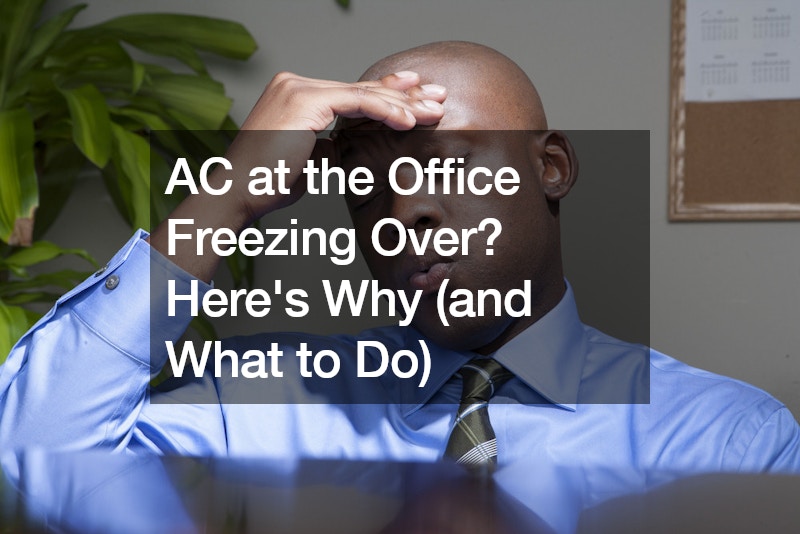As a small business owner, keeping your employees comfortable is key to maintaining productivity. But a malfunctioning air conditioning (AC) unit can quickly turn your office from a productive space to an arctic wasteland. One particularly puzzling problem is an AC unit that starts freezing up.
While it might seem counterintuitive for an AC unit to produce ice, there are several reasons why this can happen. Here, we’ll explore the eight most common culprits behind a freezing AC unit, and provide steps you can take to address them.
Dirty Air Filter: The Usual Suspect
Just like a clogged drain can cause a sink to overflow, a dirty air filter can lead to a frozen AC unit. A clogged filter restricts airflow across the evaporator coil, the part responsible for absorbing heat from the air. This reduced airflow prevents the coil from properly absorbing heat, causing its temperature to drop below freezing. As moisture in the air condenses on the cold coil, it freezes, leading to an icy buildup.
Solution: Check your air filter regularly, and replace it according to the manufacturer’s recommendations. Most filters need changing every 1-3 months, especially during periods of heavy use.
Blocked Return Vents: Starving the System for Air
Return vents are the grilles that draw air back into the air conditioning system. Blocked return vents, often caused by furniture or boxes placed too close, have a similar effect to a dirty air filter. Restricted airflow across the coil reduces heat absorption and leads to freezing.
Solution: Ensure there are no obstructions near return vents throughout your office. Keep at least 2-3 feet of clearance around each vent to allow for proper air circulation.
Low Refrigerant Levels: A Sign It’s Time to Call a Professional
Refrigerant is the lifeblood of your AC system, absorbing heat indoors and releasing it outdoors. Low refrigerant levels can occur due to leaks or improper installation. When refrigerant levels are low, the system struggles to absorb heat efficiently, leading to freezing of the evaporator coil.
Solution: Unfortunately, addressing low refrigerant levels is not a DIY project. Adding refrigerant requires specialized tools and expertise. Contact a licensed air conditioning installation specialist to diagnose the cause of the low refrigerant level and fix any leaks before refilling the system.
Setting the Thermostat Too Low: Pushing the System
While everyone enjoys a refreshingly cool office, setting the thermostat too low can overwhelm your AC unit. Most air conditioners are designed to cool a space to a minimum temperature of around 67 degrees. Setting the thermostat much lower forces the system to work harder, potentially causing the evaporator coil to freeze.
Solution: Adjust your thermostat to a more reasonable setting. A comfortable target range for most offices is between 72 to 78 degrees. This will allow your AC unit to function efficiently and prevent freezing.
Blower Motor on the Fritz: No Airflow, Big Problems
The blower motor is responsible for circulating air across the evaporator coil. If the blower motor malfunctions or burns out, airflow is significantly reduced, leading to freezing of the coil.
Solution: A malfunctioning blower motor requires professional attention. Contact an HVAC technician to diagnose the problem and determine if repair or replacement is necessary.
Faulty Control Board: The Brain Needs a Reboot
The control board is the brain of your air conditioning system, regulating various functions like the blower motor and compressor. A malfunctioning control board can send incorrect signals, leading to issues like the blower motor not running properly and causing the evaporator coil to freeze.
Solution: Troubleshooting a faulty control board is beyond the scope of most small business owners. Call a licensed HVAC technician to diagnose the problem and potentially replace the control board.
Restricted Metering Device: A Clogged Artery
The metering device in your AC system controls the flow of refrigerant through the evaporator coil. If this device becomes restricted due to debris or contaminants, it can disrupt the flow of refrigerant and lead to freezing.
Solution: Addressing a restricted metering device is a job for a qualified HVAC technician. They can diagnose the cause of the restriction and clean or replace the metering device if necessary.
Plugged Evaporator Coil: A Deep Clean Might Be Needed
The evaporator coil collects dust and dirt over time, especially if the air filter is not changed regularly. A heavily clogged evaporator coil significantly restricts airflow, leading to freezing.
Solution: Cleaning a plugged evaporator coil can be a challenging task. In some cases, you might be able to access the coil for cleaning if it has a removable access panel. However, for deep cleaning or if the coil is difficult to reach, consider hiring a professional duct cleaning company that specializes in cleaning evaporator coils
.




